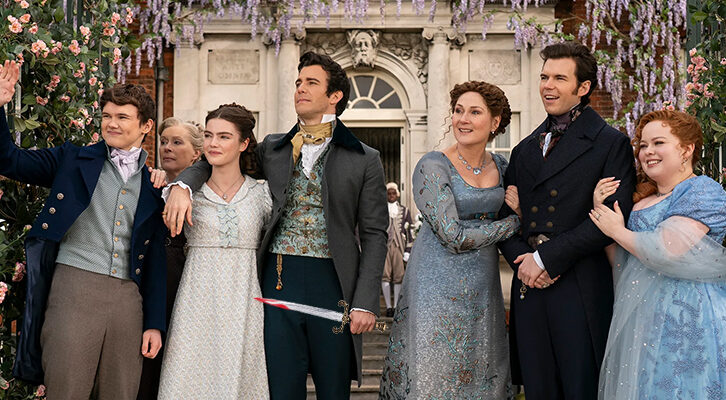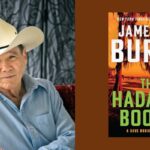
Ann Patchett on Stealing Stories, Book Tours, and Staying Off Twitter
The Author and Owner of Parnassus Books Discusses Her New Novel
Those of us who work and shop at Parnassus Books (this interview also appears at Parnassus’ blog) have a unique perspective on Ann Patchett’s novels because we witness their creation at somewhat close range. We’re here in the store when Ann comes in to pick up a stack of books she has ordered for research. We’re hanging around when she finishes a morning of writing and brings her pup Sparky over to run around the shop. We weigh in on characters’ names and book cover designs, and we celebrate when the manuscript has finally been turned in. But we’re not inside Ann’s head. We know some things about the story, but we don’t know all the ins and outs and whys and hows—unless, of course, we ask.
This interview gets into those questions. If you, too, have something you’d like to ask Ann Patchett, we highly recommend you join us for the launch of her new novel, Commonwealth, at Montgomery Bell Academy on Monday, September 12, at 6:15 p.m.—or, if you’re not in Nashville, at any of the stops she’ll be making across the country this fall.
Meanwhile, I hope you’ll enjoy this Q&A, and I know you’ll enjoy the book. There’s rarely one book a whole staff of booksellers agree on, but all of us here are on the same page when it comes to this: Commonwealth is breathtaking.
* * * *
Mary Laura Philpott: You’ve joked that this latest novel is the one most people write first, the one closest to home. What drove you to write it now that wasn’t driving you earlier?
Ann Patchett: Two things. First, I published This Is the Story of a Happy Marriage and no one in my family cared. I wrote some things about our experiences as nonfiction and it made not a ripple on the home front, so I thought, well, maybe I could use some of this in fiction as well. I’ve always been writing about my family, but up until now I’d been very clever to hide everyone in giant costumes made out of chicken wire and masking tape.
Second, my father was dying while I was writing Commonwealth, and he died well before I finished it. That had a profound effect on me in so many ways. I didn’t think my father would have liked this book, but I thought, I’m in my fifties now, and I don’t want to think that certain parts of my own life are off-limits anymore. The truth is, my father may have been fine with it. He was very supportive of me and I think he’d eased up on some of his privacy restrictions towards the end of his life.
That said, I have a real fear that the whole publication of this novel is going to center around questions of autobiography, which isn’t nearly as interesting as whether or not the book is any good. Most of the things in this book didn’t actually happen, but the feelings are very close to home. Or, as my mother said, “None of it happened and all of it’s true.”
MLP: “None of it happened, and all of it’s true” might be the very definition of good fiction. Speaking of great lines, let’s talk about the first sentence of this book: “The christening party took a turn when Albert Cousins arrived with gin.” Did that opening evolve through drafts or did it burst into being fully formed, like Athena from Zeus’s head? I love it.
AP: Thanks! I try to do a good job on first lines. Bel Canto has a good one, The Magician’s Assistant has the best one. I certainly knew that Bert’s arrival at the party was the point of entry: the door opens and there he is with the gin, and the reader pretty much knows that nothing is going to be the same. The actual wording probably took some tinkering, I don’t remember.
Did you know that John Irving can’t start a book until he’s written the last line? I admire that.
MLP: I’ve heard that about Irving and often wondered how many of the endings that he started with stayed the endings of his books (or if he has a drawerful of spare endings). You follow the family in Commonwealth over five decades. How did you know when you were finished with the characters, when their story was done?
AP: Dear Mr. Irving, Any extra endings? We will place them in good homes. Most sincerely, Ann and Mary Laura.
Commonwealth has a plot (she says somewhat defensively), but it’s one of those books that could have gone on forever. I kept cutting things out that were perfectly nice but did nothing to advance the story. I had a computer file where I would stick these things, a little novel prison, and I’d tell myself if I missed those scenes they’d be allowed to come out and get back in the book. I never missed any of it.
As far as the ending is concerned, I knew I wanted to end with a party. I knew it would be present day. I knew who needed to make one more appearance and who didn’t. The very last moment in the book is like a musical note. I knew what note I wanted to hit but I didn’t know how to find it. After the book was essentially done I spent about another ten days trying to come up with those last four or five pages. I was in the kitchen making dinner one night and thought, got it! And I did.
MLP: Another thing I think you nailed: the tension between the way we are seen by people who have known us forever and the way we can be seen by someone new. There’s a line toward the end that goes, “He believed her to be the person she was in this present moment, free from history.” Isn’t that so often the source of conflict—the struggle to reconcile past and present selves under the weight of other people’s perceptions?
AP: That was one of the scenes I cut so far back! Franny’s irritated by her husband’s unbridled admiration of her mother. He thinks she’s a goddess, he’s full of sympathy for her, and Franny is thinking, but you weren’t there all those years… I finally had to tell myself the reader is going to be able to figure this out without two pages of explanatory discourse. But that’s a good example of why it isn’t right to talk in terms of autobiography, because we’ve all had these experiences, and in this case it isn’t about me and my husband talking about my mother at all, it’s just that universal experience of feeling such affection and sympathy for someone who gets pummeled.
I think about how much I loved the parents of some of my college friends. One girl I was very close to truly couldn’t stand her mother, and I adored her mother. I went to live with her mother a couple of times. She was always taking me in. She gave me some of the best advice, including but not limited to, “Never settle for bad sex.” I was 19! I couldn’t understand what my friend found so objectionable about her.
“None of it happened and all of it’s true.” I wonder if it’s too late to slap that on as a subtitle.
 Photo by Heidi Ross
Photo by Heidi Ross
MLP: Franny’s father, Fix, says, “People are scared of the wrong things… We go around thinking that what’s going to get us is waiting on the other side of the door: it’s outside, it’s in the closet, but it isn’t like that… For the vast majority of the people on this planet, the thing that’s going to kill them is already on the inside.” (Or as my mom likes to say, “By the time you’re 40, whatever’s going to kill you has already started.” #optimism) Do you agree with Fix on that?
AP: I think we’re a lot more likely to die of heart disease than we are from a home break-in or an attack by ISIS. I don’t even think that qualifies as an opinion. It’s just a fact. I think we worry about the wrong things. We watch too many scary television shows, too many inflammatory news programs. When I lived in Montana there would be the most unbelievable deaths reported on the news every night: a woman attacked by a mountain lion in the grocery store parking lot, a guy smashing into a mountainside while hang-gliding, somebody running over a hornets’ nest on a mountain bike, a kid getting mauled by a bear. Suddenly the list of things you’re afraid of completely shifts, but still, chances are slim to vanishing that I’ll be eaten by a mountain lion. I’m much more likely to agree with your mother.
But in a strange way what that’s really all about is not getting distracted by external drama, but realizing that the essence of your life, and so the essence of your death, is something you carry with you. You may sit with that, Grasshopper.
MLP: You did a lot of reading about death during the time you were writing Commonwealth. I remember some of the books you came in to get from the store—and of course, you’ve written about them at length on your blog—but was there a thing or two you read during that time that really changed your thinking or altered the course of your writing at all?
AP: Funny, I hadn’t thought about that. It’s strange (and wonderful) to be interviewed by someone who knows what I’ve been reading for the past several years. I think rereading the Rabbit Angstrom novels probably meant the most to me. To read those books one after the other is to really read the life of a man, and to read about so many different eras of our country. I loved Updike, and he, like my father, seemed to be one of those venerable fixtures of existence that I could always count on. I finished rereading the last book, Rabbit at Rest, when my sister and I were flying out to California to see our father before he died. I finished the last page, the plane landed, I turned my phone on, and I got the message from Karl that Dad was dead. It’s all very tied together in my mind.
The great Roz Chast book Can’t We Talk About Something More Pleasant was also hugely helpful in that long stretch when my father was dying but hadn’t died yet. They way she examines her parents’ lives and deaths and her own relationship to all of it was like getting a great big hall pass to write what I wanted.
MLP: When a famous writer Franny dates turns around and writes a bestselling novel full of her family stories, we have to contemplate whether it’s a betrayal or fair game. In your writing career, you’ve had plenty of opportunity to think about who gets to tell whose story. What do you think—is there such a thing as story-stealing?
AP: There are three ways to think about this:
1. There’s the story-stealing that goes on between two writers. Elizabeth McCracken and I used to hit on the same story ideas all the time. We would be talking or doing something and we’d both instantly recognize what was happening as a potential story and shout “That’s mine!” (She always won because I was writing a novel at the time and she’s a better story writer than I’ll ever be.)
2. I was with the violinist Jennifer Koh recently and she told the most beautiful story about her violin. I said, “I’d love to write about that.” And she said, “No.” That’s easy and clear. That’s what happens with Franny and Leo. She tells him her story and he writes it. She knew what was going on. It wasn’t stealing.
3. Where it gets more complicated is when your story is also also other people’s story. Then you get into Pat Conroy country. He had a right to the stories of his life but he surely irritated the hell out of his family by claiming them. I’ve done some of that but I’m nowhere near Pat’s league. I try to talk to everyone before, during, and after to see if it’s okay. Jane Hamilton and I talk about this a lot. Her last novel The Excellent Lombards, which I loved so much, gets into the family business.
Really, everything is stealing to some extent, but it isn’t very hard to cover your tracks.
MLP: I want to suggest to all the book clubs out there that they discuss the topic of boundaries when they read this book. There are personal and professional boundaries that get crossed on purpose or by accident, and then there are boundaries that characters hold firmly to against all sorts of pressure. What are your thoughts on boundaries as you head out again on book tour?
AP: Oh, book tour. It’s going to be hard. My boundary was to not do two events in one day and that’s already been broken. I wish I could pre-sign, do the Liz Gilbert thing and explain why I can’t sign books for two hours every night and continue to live (it’s a germ thing) but I can’t seem to bring myself to do it.
I don’t think I do have boundaries on tour. I’ll take pictures and answer any question and do the cocktail reception and go to the airport at 5 am and never cancel when I’m running a fever of 103. I look at those weeks on my calendar and think, okay, here I go, I’m running into the burning building. I’ve tried so many different things to make it better and the truth is nothing makes it better. Every tour Karl insists we rent a plane and a pilot to fly me everywhere, which sounds so much more stressful and would wind up costing as much as my advance. Stephen King had perfect book tour boundaries, but then, he had been run over by a car. I think I would have to be run over by a car before I could protect myself on tour. Lots of my friends go to six cities or eight cities, I’m going to thirty. It’s such a first world problem. Poor me! Book tour! No one wants to hear it.
MLP: You set boundaries in other ways, though. You’re not on social media, for example.
AP: Yeah, well, the thing about social media is that I’ve never actually seen it. I just don’t go there, so it’s not like I even understand what I’m missing. All I know is that there is not one extra minute in the day in which to communicate. It would be like knocking seven new doors into my house. I don’t want to. Even if it would make some things easier. No More Doors.
The best of me is always going to be in the book. I gave the book everything. I’m proud of it. I can sign it or read from it or tweet about it or gift wrap it but the book itself is still the same. If you’ve got that, you’ve got me.
* * * *
Purchase Commonwealth from your local independent bookstore; get it signed by Ann at one of her tour stops; or reserve your signed and/or personalized copy by pre-ordering from Parnassus Books.
Feature photo by Heidi Ross.
Mary Laura Philpott
Mary Laura Philpott is the author of a forthcoming memoir-in-essays, I Miss You When I Blink (2019), as well as the illustrated humor collection, Penguins with People Problems. She also runs Musing, the online magazine of Parnassus Books, and co-hosts A Word on Words for Nashville Public Television. She’s on Twitter @marylauraph.



















